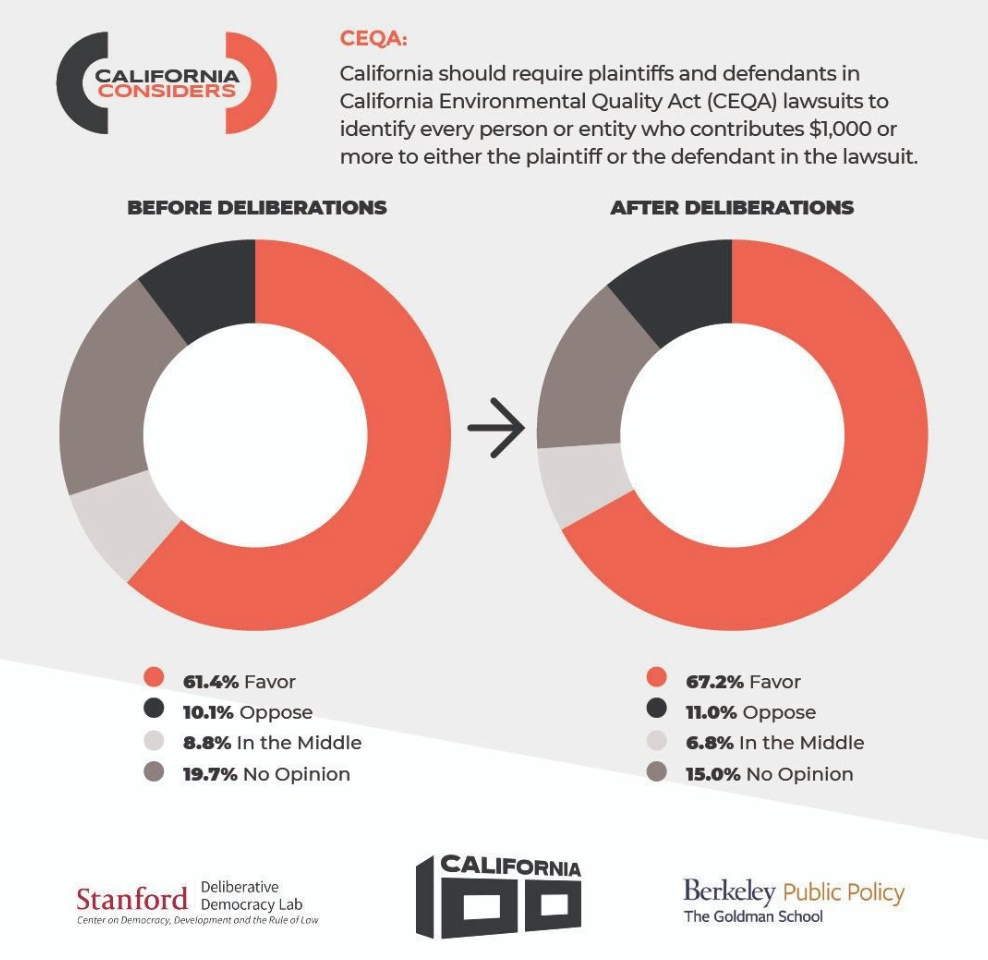Two-Thirds of Californians Want to Know Who’s Funding Environmental Lawsuits
Commentary I was recently introduced to California 100 by Sal Rodriguez, the opinion editor for the Southern California News Group, which includes the Orange County Register. It’s a think tank of sorts and provides the following to describe itself: “California 100 is a transformative statewide initiative focused on inspiring a vision and strategy for California’s next century that is innovative, sustainable, and equitable. The initiative is incubated at the University of California and Stanford, and is guided by an expert and intergenerational Commission.” Last week it provided the results of a poll that addressed a number of key issues facing Californians. One question and its responses stood out and is worth a little commentary from this former State Senator. (Screenshot via California 100) The poll asked if “California should require plaintiffs and defendants in California Environmental Quality Act (CEQA) lawsuits to identify every person or entity who contributes $1,000 or more to either the plaintiff or the defendant in the lawsuit.” Six out of ten responded in favor of requiring disclosure of the plaintiffs filing lawsuits against housing developers in order to find out who is suing them. After fully appreciating the fact that businesses attempting to build apartments or similar housing stock are sued by parties who are unnamed, usually hiding behind pseudonyms, like Neighbors for Good Development or some other trite phrase, two-thirds responded in favor of such a change. The defendant usually finds out who filed the lawsuit at the conclusion of the case. CEQA is defined as “a statute that requires state and local agencies to identify the significant environmental impacts of their actions and to avoid or mitigate those impacts, if feasible.” Governor Reagan signed the law with the intention of only considering the environmental impacts of large, government projects, not housing. Regretfully, after decades of litigation, CEQA has made building new housing extremely difficult and has added to its costs. I was recently with a friend who was involved in the building of an apartment complex. The project was delayed because they were sued under CEQA by a front group for industry unions who found that holding up projects is an effective way to pressure builders into hiring the very few construction contractors that are still union shops. It’s a form of greenmail and adds to the overall cost of the construction. Using CEQA to extort investors in addressing one of the most critical needs in California, more housing, is not only legal, but condoned by the Democrats in Sacramento. The joys of having been a State Senator was trying to put an end to this nonsense. In 2016, I submitted Senate Bill 1248, titled “Environmental quality: judicial challenge: identification of contributors.” It addressed the anonymity of CEQA lawsuit abusers and required that transparency and knowing one’s accusers must be provided for the defendants. My bill was referred to the Senate Committee on Environmental Quality and heard on April 10, 2016. After making the presentation, the two Republicans on the Committee, former Senators Pat Bates and Ted Gaines, voted in favor. The five Democrats, former Senators Hill, Jackson, Leno, and Pavley, along with the Chair, current State Senator Wieckowski, voted in opposition. Why would they oppose good government and transparency? Because private sector unions and extreme environmental groups also have their claws into Democratic legislators. The consultant for the committee provided the following conclusion for the Committee report: “Questions arise as to whether this bill infringes on a person’s fundamental right of freedom of association, whether focusing on who is suing takes away from enforcement efforts to comply with the law, and how prevalent CEQA litigation actually is. Considering the issues raised above, the Committee may wish to consider the need for this bill.” No wonder there is a housing shortage, and you don’t have to look far for whom to blame. Trying to improve upon CEQA has been touted by Governors Brown and Newsom, to no avail. In 2019, Senator Caballero tried to expedite these nuisance lawsuits for certain government projects with Senate Bill 25 (California Environmental Quality Act: projects funded by qualified opportunity zone funds or other public funds). When it went before the Senate Environmental Quality Committee, Senator Wieckowski was back with one of the two votes in opposition. He also opposed it in the Senate Judiciary Committee, with Senator Jackson not voting (equivalent to a “no” vote). It passed on the Senate Floor with 28 votes, exposing the divide within the Senate Democrats over this critical issue. It would face minor turbulence in the Assembly and be withdrawn by the author after successfully passing the first Committee hearing. It’s great to see California 100 including this necessary reform in its discussions to make the Golden State’s

Commentary
I was recently introduced to California 100 by Sal Rodriguez, the opinion editor for the Southern California News Group, which includes the Orange County Register. It’s a think tank of sorts and provides the following to describe itself:
“California 100 is a transformative statewide initiative focused on inspiring a vision and strategy for California’s next century that is innovative, sustainable, and equitable. The initiative is incubated at the University of California and Stanford, and is guided by an expert and intergenerational Commission.”
Last week it provided the results of a poll that addressed a number of key issues facing Californians.
One question and its responses stood out and is worth a little commentary from this former State Senator.

The poll asked if “California should require plaintiffs and defendants in California Environmental Quality Act (CEQA) lawsuits to identify every person or entity who contributes $1,000 or more to either the plaintiff or the defendant in the lawsuit.”
Six out of ten responded in favor of requiring disclosure of the plaintiffs filing lawsuits against housing developers in order to find out who is suing them. After fully appreciating the fact that businesses attempting to build apartments or similar housing stock are sued by parties who are unnamed, usually hiding behind pseudonyms, like Neighbors for Good Development or some other trite phrase, two-thirds responded in favor of such a change. The defendant usually finds out who filed the lawsuit at the conclusion of the case.
CEQA is defined as “a statute that requires state and local agencies to identify the significant environmental impacts of their actions and to avoid or mitigate those impacts, if feasible.” Governor Reagan signed the law with the intention of only considering the environmental impacts of large, government projects, not housing. Regretfully, after decades of litigation, CEQA has made building new housing extremely difficult and has added to its costs.
I was recently with a friend who was involved in the building of an apartment complex. The project was delayed because they were sued under CEQA by a front group for industry unions who found that holding up projects is an effective way to pressure builders into hiring the very few construction contractors that are still union shops. It’s a form of greenmail and adds to the overall cost of the construction. Using CEQA to extort investors in addressing one of the most critical needs in California, more housing, is not only legal, but condoned by the Democrats in Sacramento.
The joys of having been a State Senator was trying to put an end to this nonsense. In 2016, I submitted Senate Bill 1248, titled “Environmental quality: judicial challenge: identification of contributors.” It addressed the anonymity of CEQA lawsuit abusers and required that transparency and knowing one’s accusers must be provided for the defendants.
My bill was referred to the Senate Committee on Environmental Quality and heard on April 10, 2016. After making the presentation, the two Republicans on the Committee, former Senators Pat Bates and Ted Gaines, voted in favor. The five Democrats, former Senators Hill, Jackson, Leno, and Pavley, along with the Chair, current State Senator Wieckowski, voted in opposition.
Why would they oppose good government and transparency? Because private sector unions and extreme environmental groups also have their claws into Democratic legislators.
The consultant for the committee provided the following conclusion for the Committee report:
“Questions arise as to whether this bill infringes on a person’s fundamental right of freedom of association, whether focusing on who is suing takes away from enforcement efforts to comply with the law, and how prevalent CEQA litigation actually is. Considering the issues raised above, the Committee may wish to consider the need for this bill.”
No wonder there is a housing shortage, and you don’t have to look far for whom to blame.
Trying to improve upon CEQA has been touted by Governors Brown and Newsom, to no avail. In 2019, Senator Caballero tried to expedite these nuisance lawsuits for certain government projects with Senate Bill 25 (California Environmental Quality Act: projects funded by qualified opportunity zone funds or other public funds). When it went before the Senate Environmental Quality Committee, Senator Wieckowski was back with one of the two votes in opposition. He also opposed it in the Senate Judiciary Committee, with Senator Jackson not voting (equivalent to a “no” vote).
It passed on the Senate Floor with 28 votes, exposing the divide within the Senate Democrats over this critical issue. It would face minor turbulence in the Assembly and be withdrawn by the author after successfully passing the first Committee hearing.
It’s great to see California 100 including this necessary reform in its discussions to make the Golden State’s future sustainable. And with two-thirds support for a simple CEQA change, it should be worthy of another legislative attempt. But with the current supermajority in Sacramento, the potential author of the bill will either look like Don Quixote or the kind of independent leader our State Capitol desperately needs. Get this bill on the Governor’s desk, and if Newsom is serious, we may see a necessary reform in addressing the real systemic problem that created California’s housing shortage in the first place.
Views expressed in this article are the opinions of the author and do not necessarily reflect the views of The Epoch Times.












